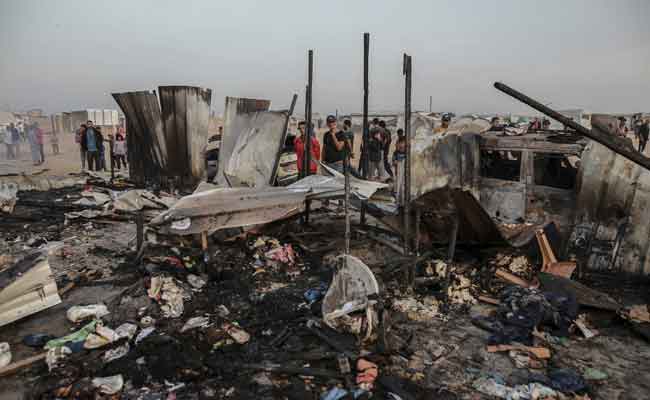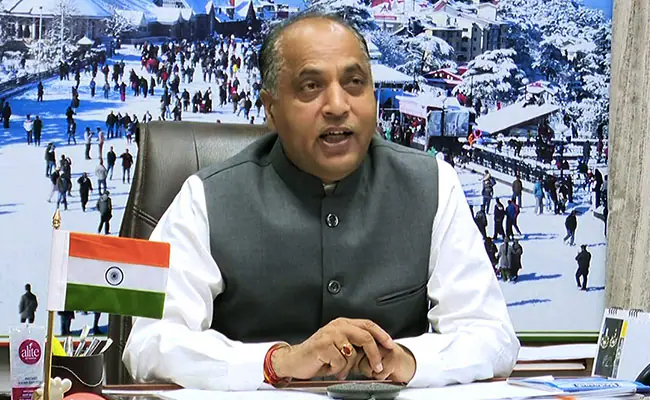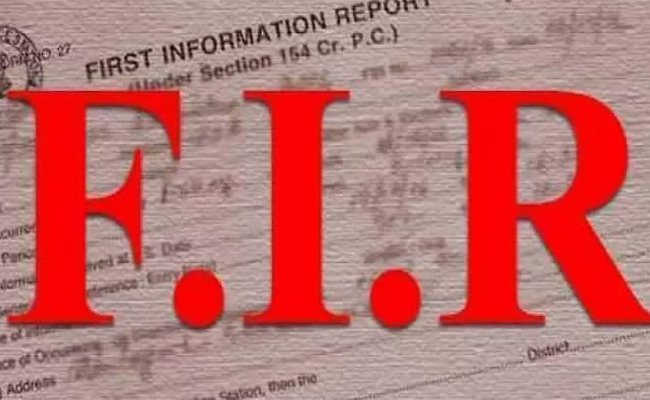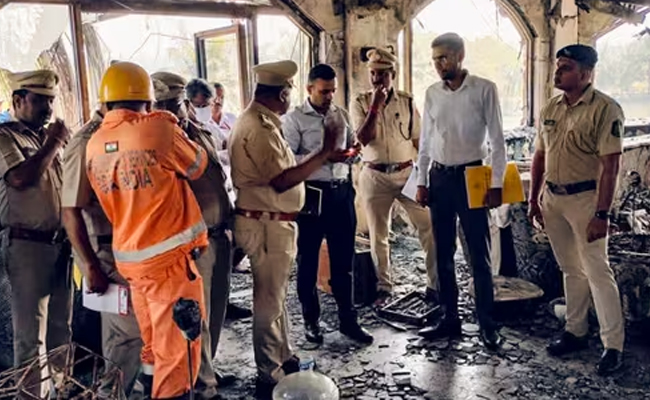Deir Al-Balah (AP): The tent camps stretch for more than 16 kilometres (10 miles) along Gaza's coast, filling the beach and sprawling into empty lots, fields and town streets. Families dig trenches to use as toilets. Fathers search for food and water, while children scavenge in garbage and wrecked buildings for scraps of wood or cardboard for their mothers to burn for cooking.
Over the past three weeks, Israel's offensive in Rafah has sent nearly a million Palestinians fleeing the southern Gaza city and scattering across a wide area. Most have already been displaced multiple times during Israel's nearly 8-month-old war in Gaza, which is aimed at destroying Hamas but has devastated the territory and caused what the United Nations says is a near-famine.
The situation has been worsened by a dramatic plunge in the amount of food, fuel and other supplies reaching the UN and other aid groups to distribute to the population. Palestinians have largely been on their own to resettle their families and find the basics for survival.
“The situation is tragic. You have 20 people in the tent, with no clean water, no electricity. We have nothing,” said Mohammad Abu Radwan, a schoolteacher in a tent with his wife, six children, and other extended family.
“I can't explain what it feels like living through constant displacement, losing your loved ones,” he said. “All of this destroys us mentally.”
Abu Radwan fled Rafah soon after the Israeli assault on the city began on May 6 as bombardment neared the house where he was sheltering. He and three other families paid USD 1,000 for donkey carts to take them to the outskirts of Khan Younis, about 6 kilometres (3.6 miles) away, where it took a day living outside before they could assemble the materials for a makeshift tent. Next to the tent, they dug a toilet trench, hanging blankets and old clothes around it for privacy.
Families usually have to buy the wood and tarps for their tents, which can run up to USD 500, not counting ropes, nails and the cost of transporting the material, the humanitarian group Mercy Corps said.
Israeli authorities controlling all entry points into Gaza have been letting greater numbers of private commercial trucks into the territory, the UN and aid workers say. More fruits and vegetables are found in markets now, and prices on some have fallen, Palestinians say.
Still, most homeless Palestinians can't afford them. Many in Gaza have not received salaries for months and their savings are depleting. Even those who have money in the bank often can't withdraw it because there is so little physical cash in the territory. Many turn to black market exchanges that charge up to 20 per cent to give cash for transfers from bank accounts.
Meanwhile, humanitarian convoys with supplies for the UN and other aid groups to distribute for free have fallen to nearly their lowest levels in the war, the UN says.
Previously, the UN was receiving several hundred trucks a day. That rate has dropped to an average of 53 trucks a day since May 6, according to the latest figures from the UN humanitarian office OCHA on Friday. Some 600 trucks a day are needed to stave off starvation, according to USAID.
In the past three weeks, most of the incoming aid has entered through two crossings from Israel in northern Gaza and via a US-built floating pier taking deliveries by sea. The two main crossings in the south, Rafah from Egypt and Kerem Shalom from Israel, are either not operating or are largely inaccessible for the UN because of fighting nearby. Israel says it has been letting hundreds of trucks through Kerem Shalom, but the UN has only been able to collect about 170 of them on the Gaza side over the past three weeks because it can't reach the crossing.
Entry of fuel has fallen to about a third of what it was before the Rafah offensive, according to OCHA. That reduced amount has to be stretched between keeping hospitals, bakeries, water pumps and aid trucks working.
The American humanitarian group Anera “is having difficulty distributing what we are able to bring in to the people who need it because there's so little fuel for trucks,” its spokesperson Steve Fake said.
Most of those fleeing Rafah have poured into a humanitarian zone declared by Israel that is centred on Muwasi, a largely barren strip of coastal land. The zone was expanded north and west to reach the edges of Khan Younis and the central town of Deir al-Balah, both of which have also filled with people.
“As we can see, there is nothing humanitarian' about these areas,” said Suze van Meegen, head of operations in Gaza for the Norwegian Refugee Council, which has staff operating in Muwasi.
Much of the humanitarian zone has no charity kitchens or food market, no hospitals operating, only a few field hospitals and even smaller medical tents that can't handle emergencies, only pass out painkillers and antibiotics if they have them, according to testimony from Mercy Corps. “It's just a matter of time before people begin to suffer greatly from food insecurity,” the group said.
The Muwasi area is mostly coastal dunes with no water resources or sewage systems. With human waste deposited near the tents and garbage piling up, many people suffer from gastrointestinal diseases such as hepatitis and diarrhea, as well as skin allergies and lice, Mercy Corps said.
One aid worker who fled Rafah said he was lucky and could afford to rent a house in Deir al-Balah. “You can't walk” in the town from all the tents that have arisen, he said, speaking on condition of anonymity because his agency had not authorised him to speak.
Many people he sees in the street are yellow with jaundice or hepatitis, and “the stench is disgusting” from the sewage and piles of garbage.
The war between Israel and Hamas has killed nearly 36,000 Palestinians, according to Gaza's Health Ministry.
Let the Truth be known. If you read VB and like VB, please be a VB Supporter and Help us deliver the Truth to one and all.
Visakhapatnam (PTI): Shafali Verma hit a blistering unbeaten 69 as India made short work of a paltry target to outclass Sri Lanka by seven wickets in the second Women’s T20 International here on Tuesday.
India now lead the five-match series 2-0 after another one-sided victory, having restricted Sri Lanka to a modest 128 for 9 through a collective display of disciplined bowling from the spin trio of seasoned Sneh Rana, ably complemented by young spinners Vaishnavi Sharma and Shree Charani.
During the chase, vice-captain Smriti Mandhana (14) fell cheaply but Shafali, enjoying new found confidence after a stellar show in the World Cup final, sent the bowlers on a leather-hunt during her 34-ball knock, winning it for her team in just 11.5 overs.
The hosts have now completed back-to-back successful chases within 15 overs which speaks volumes about the unit's sky-high confidence.
Shafali's innings had 11 punchy boundaries apart from a maximum.
The floodgates opened when left-arm spinner Inoka Ranaweera bowled a few flighted deliveries and Shafali would step out everytime to hit her over extra cover. Her footwork against slow bowlers was immaculate whether stepping out to loft the ball or rocking back to punch or pull.
Seeing her confidence, the newly appointed Delhi Capitals skipper Jemimah Rodrigues (26 off 15 balls) also attacked as the duo added 58 runs in just 4.3 overs.
By the time Rodrigues was out trying to hit one six too many, the match as a contest was over. Shafali completed her half-century off just 27 balls and completed the formalities in a jiffy.
Earlier, off-spinner Rana, who got a look-in after Deepti Sharma was ruled out due to fever, showed her utility keeping the Lankan batters under tight leash with figures of 1 for 11 in 4 overs, including a maiden which certainly is a rarity in T20 cricket.
Charani, who made an impression during India's ODI World Cup triumph, took 2 for 23 in her quota of overs, while Vaishnavi after an impressive debut in the opening encounter, finished with 2 for 32, not letting the Islanders get easy runs in her second spell.
The last six wickets fell for just 24 runs, but what stood out during India’s bowling effort was their superb ground fielding. After a patchy show in the previous game, the improved sharpness in the field resulted in three run-outs.
Sri Lankan skipper Chamari Athapaththu (31 off 24 balls) looked in good nick as she deposited length deliveries from seamers Kranti Gaud and Arundhati Reddy over the ropes but it was Rana, who kept her quiet by repeatedly pitching on good length.
Unable to manoeuvre the strike and with the big hits suddenly drying up, Athapaththu chanced her arm at another delivery in which Rana had shortened the length slightly.
Not having transferred the weight into the lofted shot, Athapaththu's hoick was pouched cleanly by Amanjot Kaur at long-off.
This was after Athapaththu's opening partner Vishmi Gunaratne (1) had offered a simple return catch to Gaud.
Hasini Perera (22 off 28 balls) and Harshitha Samarawickrama (33 off 32 balls) did stitch a stand of 44 but they could never set the tempo against the Indian spin troika.
Once Hasini offered a tame return catch off a Charani full-toss, Sri Lankans never recovered and lost wickets in a heap towards the end.





